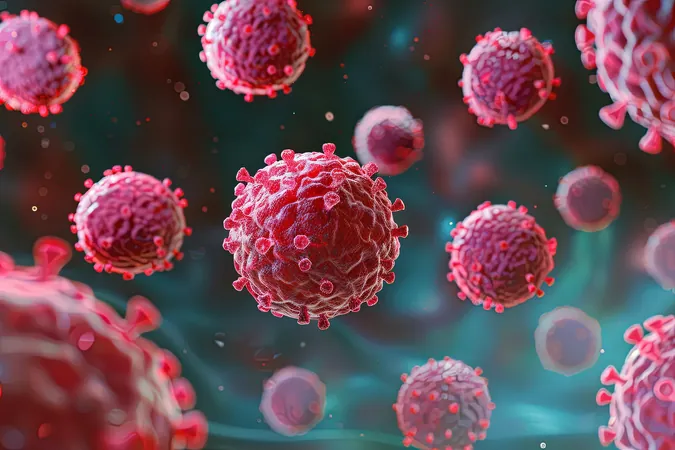
Unlocking the Secrets of QRICH1: A Game-Changer in Immune Therapy
2025-04-09
Author: Arjun
A Groundbreaking Discovery in Immune Cell Activation
In a groundbreaking study at Johns Hopkins Medicine, scientists have uncovered a surprising role for the QRICH1 protein in immune cell activation. This revelation could pave the way for innovative drug development aimed at fine-tuning T cell responses, enhancing their ability to combat cancers and autoimmune disorders.
Revolutionizing Immunotherapy
The research targeted the advancement of immunotherapies that leverage the body’s immune power to obliterate diseases. These therapies are crucial in treating cancer by accelerating tumor cell death and in managing autoimmune conditions, where the immune system mistakenly attacks healthy cells.
Dr. Joel Pomerantz, the study's senior author, emphasized the significance of finding new drug targets for these therapies. Such advancements could make treatments safer and more effective, providing a hopeful avenue for patients battling severe conditions.
QRICH1: The Newly Discovered Regulator of T Cells
Using cutting-edge research funded by the National Institutes of Health, the findings were published on March 14 in *Science Immunology*. QRICH1 is a recently identified player in the signaling pathways of CD8+ T cells, pivotal warriors in our immune defense system. The research suggests that QRICH1 acts as a partial brake, regulating T cell responses, hinting that manipulating its activity could lead to groundbreaking therapies.
Targeting Cancer and Autoimmune Diseases
In cancer treatment, enhancing T cell activation via QRICH1 could potentially empower these immune cells to effectively eliminate cancer cells. Conversely, in autoimmune diseases and specific blood cancers like leukemia, where T cell overactivity exacerbates conditions, QRICH1 could be harnessed to temper this response.
Innovative Experiments with Engineered Mice
The research began with scientists genetically engineering mice to lack the QRICH1 protein. Experiments revealed that QRICH1 is essential for the CD8+ T cell signaling pathway. By comparing T cells from QRICH1-deficient mice against those with normal QRICH1, the scientists observed a marked increase in T cell activity in the absence of this protein when faced with infected cells.
Responses to Natural Infections
In exploring responses to real-world infections, mice without QRICH1 exhibited a significantly stronger immune reaction to listeria monocytogenes, a foodborne bacterium. Dr. Pomerantz pointed out that T cells lacking QRICH1 became more activated even during natural infections, showcasing the protein's role in regulating immune responses.
Looking Ahead: Targeting QRICH1 for Cancer Therapy
The next steps for researchers involve exploring how T cells devoid of QRICH1 respond to cancer cells specifically. Their insights shed light on a promising new molecular mechanism controlling immune cell activation. Understanding and targeting this pathway could revolutionize therapeutic strategies, particularly in cancer treatment.
A Bright Future for Immunotherapy
This research not only unlocks a potential new pathway for drug development but also provides a fresh perspective on enhancing immune function. If effective drugs targeting QRICH1 can be developed, they could play a crucial role in the ongoing battle against cancer and other immune-related diseases.


 Brasil (PT)
Brasil (PT)
 Canada (EN)
Canada (EN)
 Chile (ES)
Chile (ES)
 Česko (CS)
Česko (CS)
 대한민국 (KO)
대한민국 (KO)
 España (ES)
España (ES)
 France (FR)
France (FR)
 Hong Kong (EN)
Hong Kong (EN)
 Italia (IT)
Italia (IT)
 日本 (JA)
日本 (JA)
 Magyarország (HU)
Magyarország (HU)
 Norge (NO)
Norge (NO)
 Polska (PL)
Polska (PL)
 Schweiz (DE)
Schweiz (DE)
 Singapore (EN)
Singapore (EN)
 Sverige (SV)
Sverige (SV)
 Suomi (FI)
Suomi (FI)
 Türkiye (TR)
Türkiye (TR)
 الإمارات العربية المتحدة (AR)
الإمارات العربية المتحدة (AR)